Announcing the 2025 Innovator Award Winners
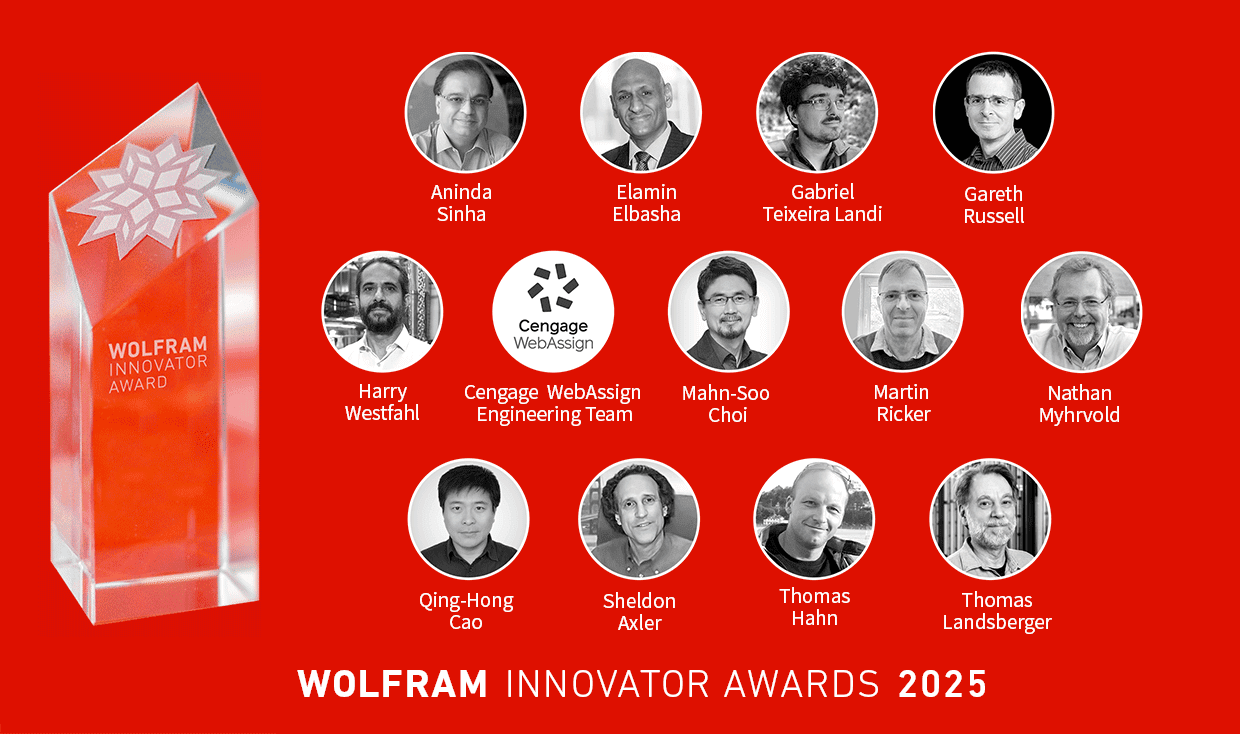
With each Wolfram Technology Conference comes the Wolfram Innovator Awards, where we seek out a new round of computational trailblazers across all disciplines. Every year we are in awe seeing all of the new ways of applying concentrated computational creativity that break the boundaries of technology and remind us all to never stop pushing.
Without further ado, we present and congratulate the 2025 Wolfram Innovator Award winners.
Aninda Sinha
Professor at the Indian Institute of Science, Centre for High Energy Physics Department
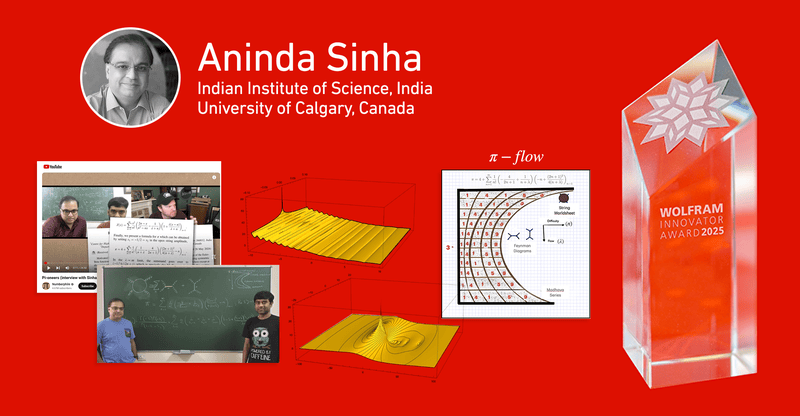
Aninda Sinha has been testing the limits in the worlds of quantum field theory, string theory, cosmology and mathematical physics. Currently a professor at the Indian Institute of Science and senior fellow at Quantum Horizons Alberta at the University of Calgary, Sinha has been celebrated as an avid mathematics communicator both in the classroom and his nearly 80 peer-reviewed publications. He has discovered new approaches to mathematics and physics, while also refining existing ones—reshaping our understanding of how math exists and its impact on the universe. Recently, while researching string theory and Feynman diagrams, he and his team stumbled across a new series of formulas for pi, which was listed as one of Scientific American’s “7 Coolest Mathematical Discoveries of 2024.”
Health Economic Decision Sciences (HEDS) Team, Merck & Co., Inc.
Accepted by: Elamin Elbasha, Executive Director
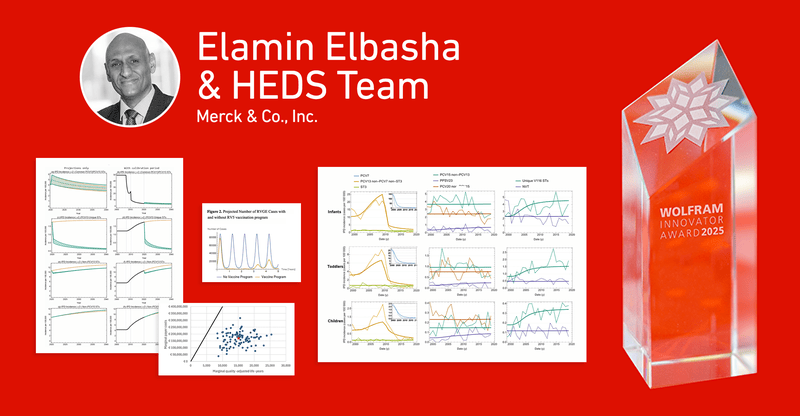
Protecting the public from infectious agents isn’t easy, but it is always worth it. The Health Economic Decision Sciences (HEDS) team, led by Elamin Elbasha, at Merck helps to guide and develop the vaccines that protect us from viruses and bacteria like HPV, RSV and pneumococcus and so much more. The team works endlessly to assess the needs of evolving strains—including analyzing diseases and modeling vaccines using Wolfram Language.
Elbasha first entered the public health industry as an economist for the Centers for Disease Control (CDC) and, after 25 years, is currently the executive director of the HEDS team. During this time, he has become a pioneer for the use of mathematical modeling in developing and deploying vaccines. At the 2024 Society for Industrial and Applied Mathematics conference, he presented on his research on developing an HPV vaccine and was a panelist sharing his journey and passion for the field of healthcare. His efforts in mathematical modeling have paved a new path in health care to save lives, resources and costs.
Gabriel Teixeira Landi
Associate Professor, University of Rochester
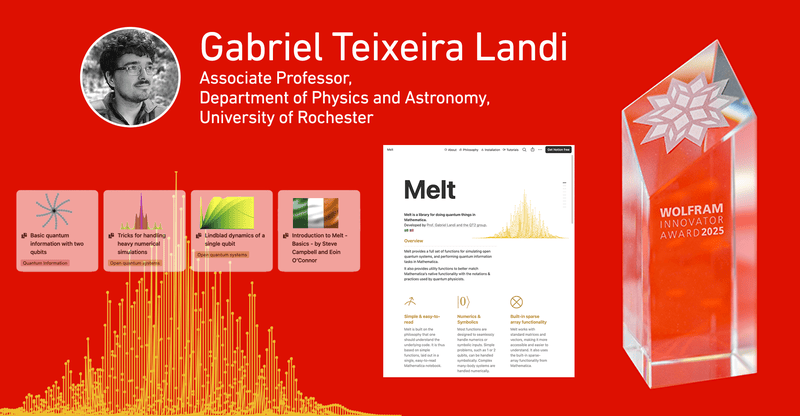
Professor of quantum science and technology, editor of Physical Review Research and developer of a quantum package for Wolfram Language called Melt, Gabriel Teixeira Landi is a specialist in the field of open quantum systems, with applications to quantum thermodynamics, transport and metrology. His research focuses on reformulating the laws of thermodynamics and concepts such as resource expenditure and irreversibility within a quantum-coherent context. Landi also specializes in the statistical description of quantum trajectories, combining the tools of quantum mechanics with stochastic processes. The research aims to address fundamental questions, as well as propose novel applications in quantum sensing, energy harvesting devices and quantum computing.
His package for Wolfram, Melt, provides a full set of functions for simulating open quantum systems and performing quantum information tasks while integrating Wolfram’s native functions and the industry-standard practices of quantum physicists.
Gareth Russell
Associate Professor, Associate Chair and Undergraduate Director, Biological Sciences, New Jersey Institute of Technology
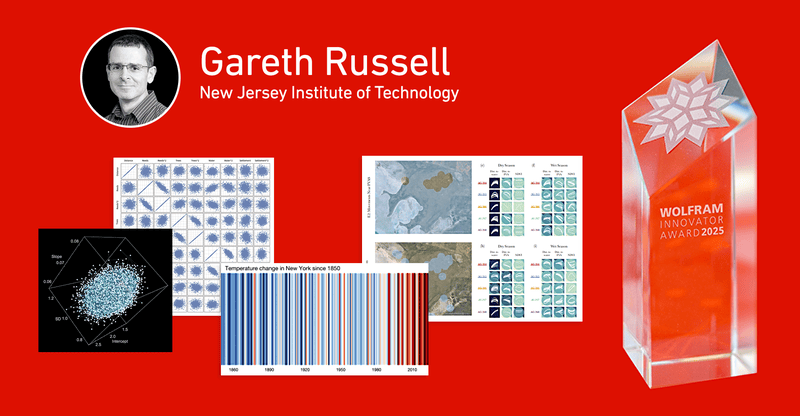
Gareth Russell is a computational ecologist and conservation biologist, focusing on spatial and movement ecology. He started using Wolfram at Version 4, mainly for population modeling, and expanded his use as its capabilities have grown. Currently, he uses it to build and fit statistical models of animal movement in complex real-world landscapes, which also requires the processing of geospatial movement tracks and the processing and sampling of remotely sensed data layers.
From the beginning, Russell also brought Wolfram into his teaching from complete graduate courses in computational ecology and statistics to course modules on epidemiology to general education labs that introduce freshmen to chaos, fractals and other amazing phenomena. For a while he ran a self-hosted webMathematica site that provided free tools for doing common basic calculations in conservation biology. Recently he has been experimenting with building specialized specialized convolutional neural networks (CNNs) for the separation of certain hard-to-distinguish species encountered during biodiversity surveys.
Harry Westfahl
Director of the Brazilian Synchrotron Light Laboratory, Brazilian Center for Research in Energy and Materials
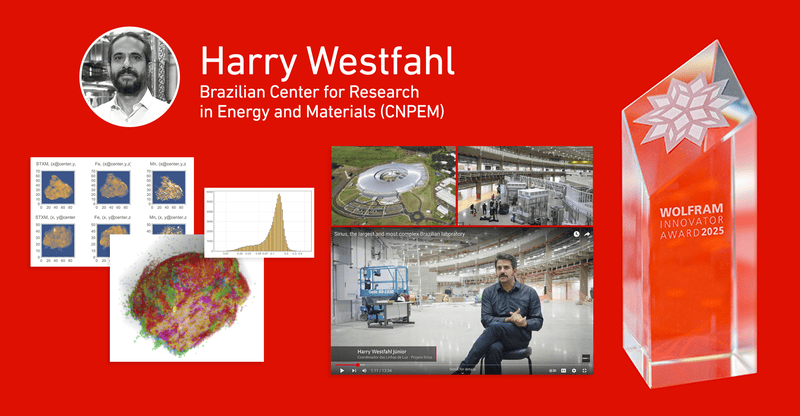
Harry Westfahl is the director of the Brazilian Synchrotron Light Laboratory at the Brazilian Center for Research in Energy and Materials. His research work focuses on condensed matter physics and advanced synchrotron instrumentation, most notably, developing the experimental stations of Sirius, one of the most advanced synchrotron accelerators in the world. He considers himself to be both a scientist and technology administrator in bridging computational prototyping with the physical development and engineering of Sirius. Westfahl used Wolfram Language to test, prototype and validate ideas and also manage his team—including sending blueprints. The development of Sirius required an overhaul in our current understanding of synchrotron technology, pushing Westfahl’s team to the edge of our understanding of physics. Now, with the completion of Sirius, synchrotron light can be used to push advancements across disciplines to new levels by showing materials at a new scale.
WebAssign Engineering Team, Cengage Group, Inc.
Accepted by: Tony Parise, Josh Huber and John Fowler

It’s no secret that the rapid shifts in technology over the last 30 years have significantly impacted the needs of students from their first steps into kindergarten to the graduate level. Since 2008, Cengage has stepped up to the challenge in presenting higher education mathematics courses with WebAssign—which uses Wolfram Language to provide real-time, intelligent grading for students. The integration of Wolfram with Cengage’s materials allows for grading that gives grace for ambiguous responses, allowing students to focus on learning materials rather than stressing over solving the riddles of simplification, variable capitalization, similar characters and more—which can change between assessments in other software. Wolfram recognizes the WebAssign team’s continued commitment to modern learning and adapting with student needs.
Mahn-Soo Choi
Director, School of Quantum, and Professor of Physics, Korea University
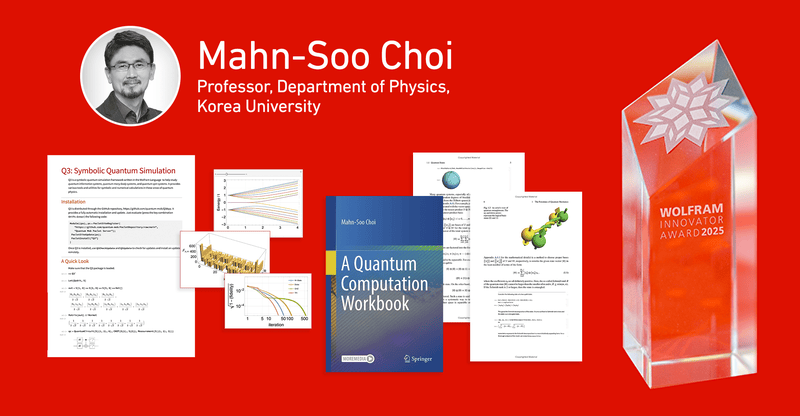
It has been said that to teach is to push students to make their own discoveries, an idea that Mahn-Soo Choi carries into his classroom as a professor of physics and the director of the School of Quantum at Korea University. Choi’s expertise lies in quantum science and technology; his emphasis, however, is in the actual study of quantum rather than the minutia that leads to studying quantum.
At the beginning of his teaching career, Choi developed Wolfram packages for his students studying quantum many-body systems and quantum spin systems—allowing for discovery and immersion without being hung up on the technical calculations. The packages eventually became Q3, a symbolic quantum simulation framework, which was featured in his recent book, A Quantum Computation Workbook.
Martin Ricker
Senior Research Fellow, Instituto de Biología, Universidad Nacional Autónoma de México (UNAM)
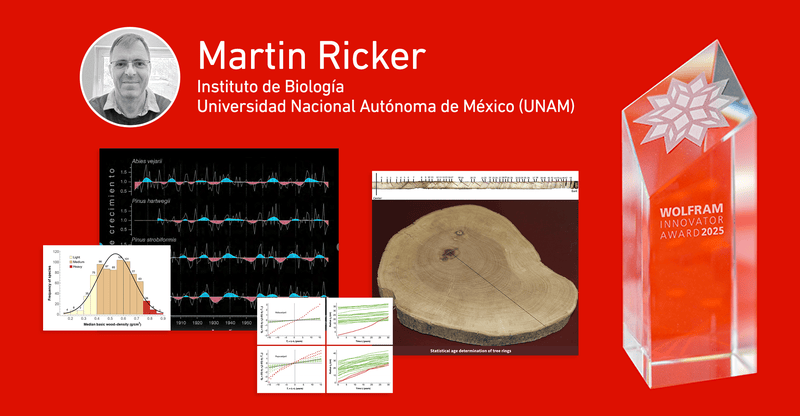
Martin Ricker is a forest scientist and botanist who does applied research about tree-growth modeling and tree diversity in tropical lowland forests. His research, focused on Mexico’s forests, centers around statistics and taxonomy, as well as some forest economics. Ricker incorporates computation, including Wolfram Language, into his work for regression and statistical analyses, model development that includes explorations with calculus, the generation of graphs and the analyses of databases. Ricker’s work has contributed methodology for modeling tree growth curves indirectly with piecewise linear regression when tree ages are unknown and knowledge about Mexico’s diversity-rich forests with close to three thousand tree species. He has also been involved in Mexico’s national forest inventory. Currently, he is using Mathematica to work on articles about generalized multivariate analysis of variance (GMANOVA) of treelet growth, and tree-species distinction for wood samples with mass-spectral data.
Nathan Myhrvold
Intellectual Ventures
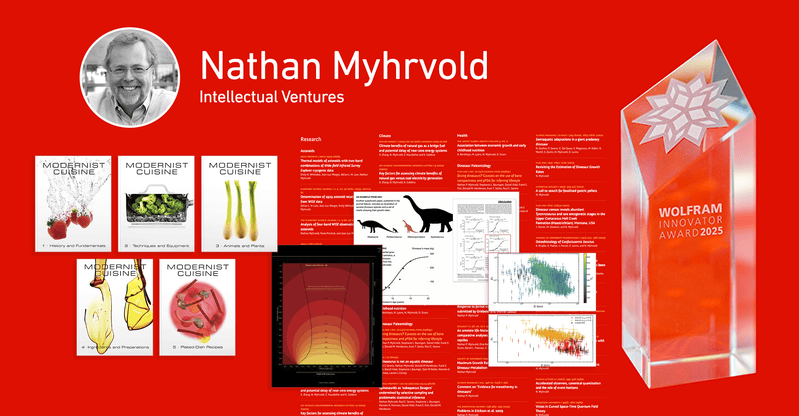
Nathan Myhrvold is a prolific inventor, scientist, author, photographer and general technology savant with more than a lifetime’s worth of computational innovation. Myhrvold earned a PhD in theoretical and mathematical physics as well as a master’s degree in mathematical economics from Princeton. He did postdoctoral work with Stephen Hawking at Cambridge University, researching quantum theories of gravitation. Myhrvold cofounded Dynamical Systems Research before joining Microsoft, where he became the company’s first chief technology officer and founded Microsoft Research. In 2000, he launched Intellectual Ventures, which he leads as CEO. He is named on more than nine hundred US patents covering fields from software and energy to medical devices and metamaterials. For decades, Myhrvold has been committed to the pursuit of world-changing advances in science and technology and has supported that through his leadership at Microsoft Research and later at Intellectual Ventures and its many spin-off companies.
Myhrvold is also a notable photographer, chef and author—known for his stunning images of landscapes and natural phenomena, published most recently in his National Geographic book Natural Wonders, and for his innovative food photography. His Modernist Cuisine cookbook series has made the science and computation that underlie all culinary arts accessible to professional and home cooks alike. Myhrvold has employed Wolfram technologies extensively in his research on culinary phenomena, paleobiology and space science.
Qing-Hong Cao
Vice Dean of the School of Physics at Peking University
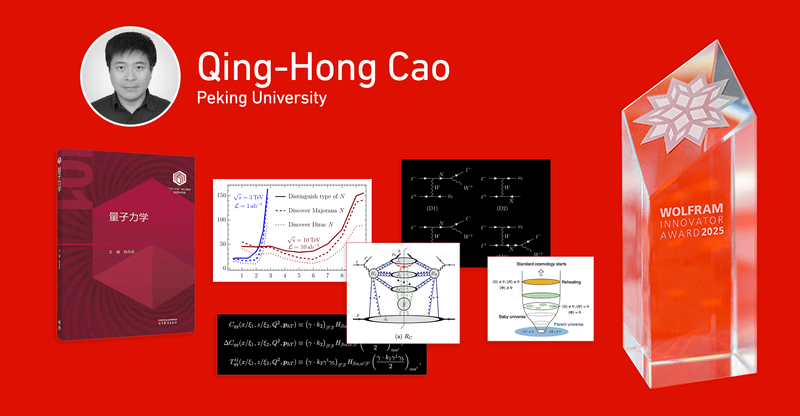
Qing-Hong Cao is reshaping the way students and researchers think of physics and the quantum realm. In the classroom, his textbook Quantum Mechanics has made waves in teaching students to shift to a quantum way of thinking and better understand a physical picture of the quantum world. Quantum Mechanics was also included in China’s 101 plan as a core textbook for physics education.
Outside of the classroom, Cao’s research work on top quark phenomenology has caught the attention of the Large Hadron Collider’s (LHC) experimental collaborations, ATLAS and CMS, who have adopted several of his proposed experimental processes, methods and observables.
Sheldon Axler
Emeritus Professor of Mathematics, San Francisco State University
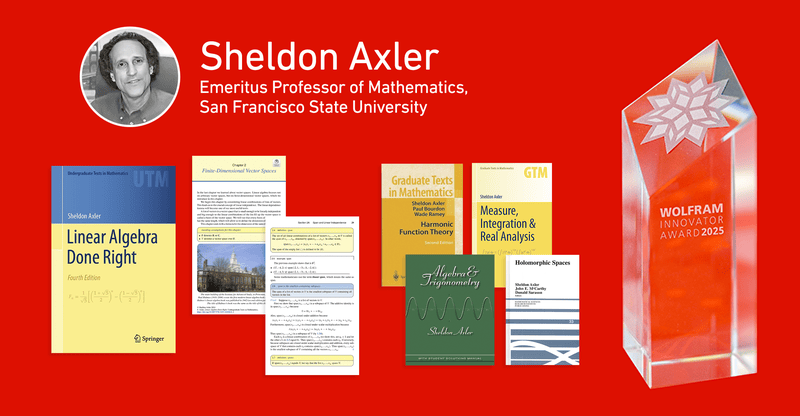
Sheldon Axler is a professor emeritus at San Francisco State University and long served the mathematical academic community in multiple leadership positions including as Dean of the College of Science & Engineering at San Francisco State University. He has published an extensive list of papers, textbooks, educational videos and software—including Harmonic Function Theory, a Wolfram package for symbolic calculations in the context of harmonic functions. Axler’s materials cover algebra to calculus to graduate-level measure theory and everything in between. Wolfram recognizes Axler’s contributions to mathematical education and publications.
Thomas Hahn
Department Leader of Information Technology, Max-Planck-Institut für Physik
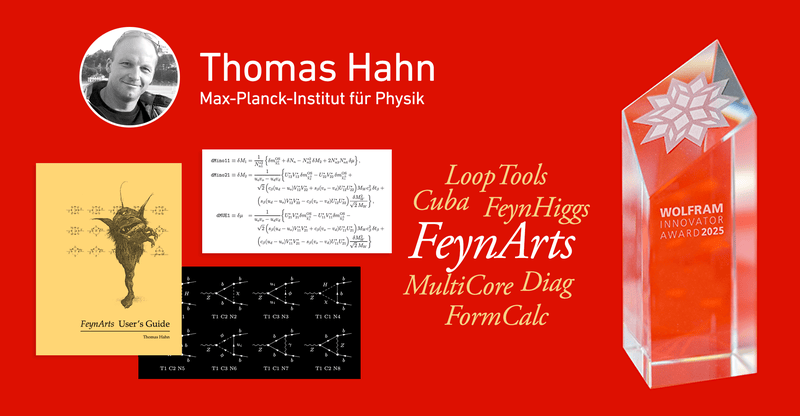
In celebrating those who bridge the gap between computation and science, there are few innovators like Thomas Hahn. As the department leader of information technology for the Max Planck Institute for Physics, Hahn’s responsibilities are to ensure that the Institute’s technical infrastructure is up to par with the needs of the researchers who constantly push through our understanding of experimental and theoretical physics. Hahn’s role requires creativity and a unique flexibility to grant researchers the space to conduct their experiments.
For over 25 years, he has redeveloped and maintained FeynArts—a Wolfram package for “the generation and visualization of Feynman diagrams and amplitudes.” Whilst working on the package, Hahn was a visiting scholar at Wolfram and contributed to graphics functionalities. In addition to FeynArts, he has also developed LoopTools, FormCalc, Cuba, MultiCore and more—all of which have supported his work in high-energy computational physics and the works of so many developers who also depend on his packages to keep up the momentum in their research.
Thomas Landsberger
Head of Research, ENODA Ltd
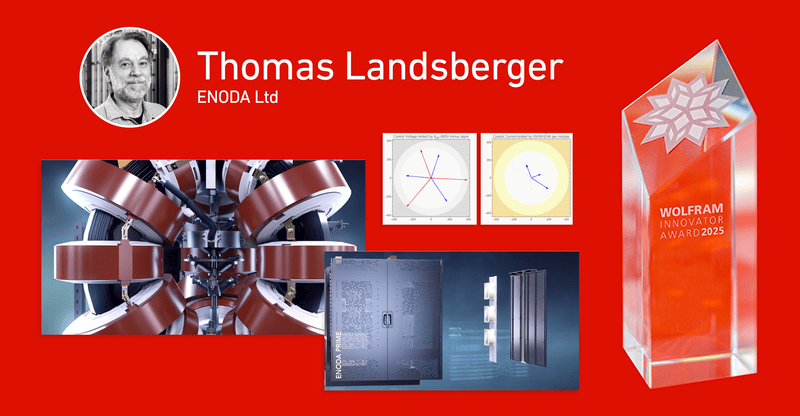
It’s not easy to solve something as complex as the transition of the electric grid from central power generation to distributed, intermittent sources, but that’s where Thomas Landsberger and the teams at ENODA Ltd come in. Their work focuses on stabilizing the grid and finding long-term energy solutions to ensure a safe and sustainable future for energy across the globe.
Thomas is an engineering leader who pushes his team at ENODA to find innovative and creative solutions, including incorporating Wolfram Language’s advanced capabilities to model electromagnetic interactions, design and implement sophisticated control systems, and optimize interdependent hardware components. His work and education in software, electrical engineering and economics have allowed him to bring a rare interdisciplinary perspective to solving high-impact technical challenges.
Congratulations to the winners of the 2025 Wolfram Innovator Awards! We look forward to seeing what’s next from these champions of computation and those yet to come.
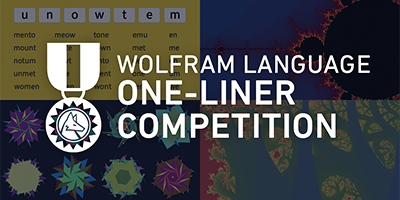


Comments